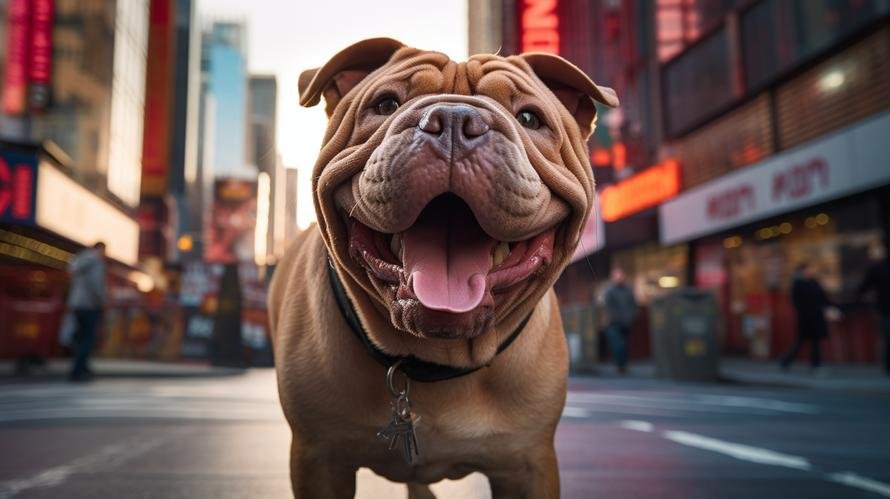Once upon a time in China, there were dogs that roamed the landscape with blue-black tongues and skin so baggy even their furrows had wrinkles! These were not just ordinary dogs. They were guardians of the house and children, wild-boar hunters, herding dogs. They were the ancient, mysterious and unique breed, the Shar-Pei.
Now, you may be wondering, “With such a sturdy and impressive history, are these dogs dangerous?” Well, let’s delve into that question!
Here’s a surprising fact: The name “Shar-Pei” literally means “sand skin” in Cantonese. This isn’t due to the color of their coat, which can range from cream to brown to black, but the texture. It’s short, bristly and somewhat rough to the touch, much like sandpaper. So, in a way, the phrase ‘bark worse than their bite’ is true for Shar-Peis!
But, does a rough coat make a dog dangerous? Hardly! Let’s settle the myths around the Shar-Pei breed, understand their nature, and determine if they are truly dangerous dogs.
If we want to understand a Shar-Pei, we should always begin by understanding their history. Shar-Peis hail from the southern provinces of China and have been bred for various purposes throughout centuries – hunting, herding, and protection. These roles explain their inherent traits of being alert, independent, and loyal.
Now, these traits don’t scream “dangerous”, do they? If we dig further, we’ll find that Shar-Peis are also known for intelligence, quietness and wariness towards strangers, but warm and affectionate with their families. Like any breed of dog, Shar-Peis can be product of both their genetic tendencies and their training and environment.
Naturally, Shar-Peis tend to be reserved and can even seem aloof. This doesn’t make them dangerous, though; it simply means that they might need some extra training and socialization to help them be comfortable around new people and situations.
Here’s a golden nugget that we, as responsible dog owners can bank on: dogs are as good or bad as their upbringing. A well-socialized Shar-Pei can be an excellent family dog. Consistent training, exposure to different people, sights, sounds, and experiences can ensure that your Shar-Pei grows to be well-behaved and friendly.
That being said, it’s also crucial to understand and respect the breed’s independent nature. As natural guardians, Shar-Peis can be stubborn at times and require a firm yet gentle hand. They respond best to positive reinforcement training methods; harsh training techniques would do more harm than good.
Now, here’s an incredible Shar-Pei factor that can work like magic: exercise! A tired dog is a good dog. Shar-Peis aren’t overly active dogs, but they do need regular exercise. Physical activity can help curb any destructive behavior, keep your dog healthy, and strengthen your bond with them.
When it comes to kids and Shar-Peis; the breed is known to be protective and devoted to their family members. However, remember our golden rule of responsible dog-ownership? Yes, upbringing matters. Teach your children how to approach and touch dogs, and supervise any interactions between dogs and young children to prevent any ear pulling, tail twisting or biting!
A clear-eyed understanding of the Shar-Pei’s breed temperament, coupled with a thoughtful training program, adequate socialization, and firm yet loving handling is our recipe to transform a Shar-Pei into a trustworthy family pet.
In short, labeling Shar-Peis or any dog breed as “dangerous” is hardly fair or accurate. The real crux of the matter isn’t about a breed’s potential for aggression, but more about the level of responsibility and commitment a dog owner brings to the table. Like any dog, a Shar-Pei can be dangerous -or not- depending not just on its breed or size, but mostly on how it’s treated and trained.
So next time someone asks you, “Is a Shar-Pei a dangerous dog?” You can answer with confidence, “No breed is inherently dangerous. It depends on their upbringing, training, and the environment.”
Remember, treat your furry friend with the love, respect, and kindness they deserve, and they will reward you with the same tenfold. Happy pet parenting!



